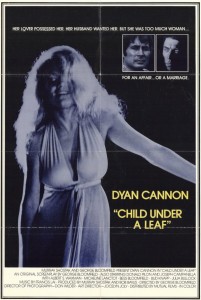Child Under a Leaf (1974)
“He might come and try to take our baby away; so I’d have to kill him.”
|
Synopsis: |
|
Genres, Themes, Actors, and Directors:
Review: To that end, there’s a seemingly endless scene in which Cannon and Pilon make gaga eyes at their baby, who lies prone on (I kid you not) piles of white fur. Later, Cannon exposes her milk-engorged breast to Pilon, as part of their foreplay — in fact, come to think of it, the entire film exists basically on the level of a porn flick, which may explain why Peary includes it in his book. Cannon does expose some bare flesh every now and then, after all, so maybe that was reason enough for him to be a fan. [Is it obvious yet how irritated I am at being “forced” to sit through this one? I’m especially annoyed that no explanatory code or review was provided to give us a sense of WHY it’s included in GFTFF.] At any rate, tension is clearly meant to build in the screenplay from both Pilon’s intermittent threats to kill Cannon’s husband (he buys a gun near the beginning) and Campanella’s sinister hints that he believes the baby in his household isn’t really his. But do these narrative threads lead anywhere logical? Not a chance. Instead, the inevitable tragedy that ultimately ensues makes little sense. Meanwhile, the egregious fetishization of an infant as an objet d’amour between the two illicit lovers may be my biggest overall complaint about the film (and that’s saying a lot); this baby clearly exists simply as a “clever” narrative device, physical “proof” of the narcissistic lovers’ illicit bond. Note: The tagline listed on IMDb — “A Motion Picture for Lovers Who Have Won or Lost…And Lovers Who Have Yet to Win or Lose!” — begins to hint at the campy humor one MIGHT find if stretching hard enough. Redeeming Qualities and Moments: Must See? Links: |


One thought on “Child Under a Leaf (1974)”
First and last viewing. Skip it.
UGH… UGH!!!… on various levels (most of them already stated above).
If only this piece of tripe had some camp quality to it. IF ONLY! But it’s nowhere near that ‘good’. It’s just godawful.